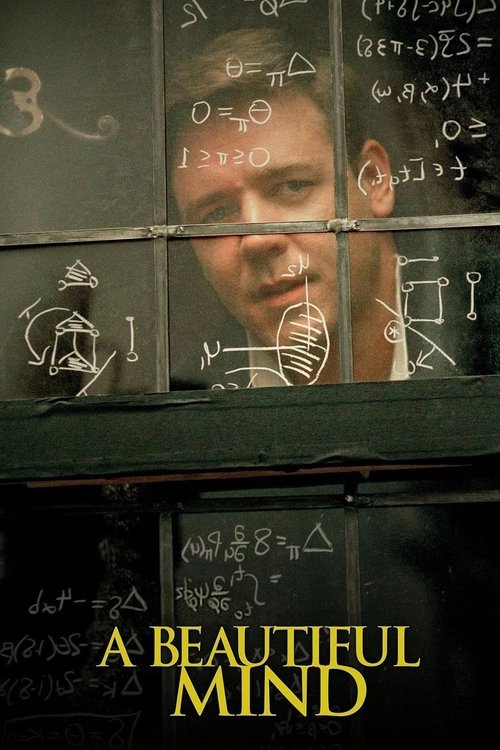
Title: A Beautiful Mind
Year: 2001
Director: Ron Howard
Writer: Akiva Goldsman
Cast: Russell Crowe (John Nash),
Jennifer Connelly (Alicia Nash),
Ed Harris (William Parcher),
Paul Bettany (Charles Herman),
Christopher Plummer (Dr. Rosen),
Runtime: 135 min.
Synopsis: From the heights of notoriety to the depths of depravity, John Forbes Nash Jr. experiences it all. As a brilliant but socially awkward mathematician, he made a groundbreaking discovery early in his career and stands on the brink of international acclaim. But as the handsome and arrogant Nash accepts secret work in cryptography, he becomes entangled in a mysterious conspiracy. His life takes a nightmarish turn and he soon finds himself on a painful and harrowing journey of self-discovery.
Rating: 7.855/10
The Fragile Geometry of Genius: A Beautiful Mind as a Tapestry of Mind and Heart
/10
Posted on June 7, 2025
Ron Howard’s A Beautiful Mind (2001) is a cinematic prism, refracting the brilliance and torment of mathematician John Nash through a lens of compassion and artistry. Based on Sylvia Nasar’s biography, the film charts Nash’s journey from prodigious scholar to paranoid schizophrenic, weaving a narrative that’s as much about the mind’s labyrinth as it is about the human connections that anchor it. Howard, with a steady hand and a knack for emotional resonance, crafts a work that’s both intellectually engaging and deeply moving, though not without its simplifications.
Russell Crowe’s portrayal of Nash is a revelation, a performance that balances arrogance, vulnerability, and quiet heroism. His transformation from a socially awkward genius to a man grappling with delusions is meticulous, his eyes conveying both the spark of discovery and the fog of fear. Crowe makes Nash’s brilliance palpable, whether scribbling equations or unraveling under invisible threats. Jennifer Connelly, as Alicia, Nash’s wife, is luminous, her steely resolve and tender devotion grounding the film’s emotional core. Their chemistry is the heartbeat of the story, though supporting players like Ed Harris and Paul Bettany, while compelling, occasionally feel like narrative devices rather than fully fleshed-out characters.
Howard’s direction is polished, using visual motifs spiraling equations, shadowy figures to mirror Nash’s mental state. Cinematographer Roger Deakins crafts a world of warm golds and cold blues, contrasting Nash’s intellectual triumphs with his psychological descent. The film’s depiction of schizophrenia, while dramatized, is hauntingly effective, though it takes liberties with reality for narrative clarity, occasionally smoothing over the messier truths of Nash’s life. The pacing falters in the middle, with repetitive scenes of paranoia that stretch the tension thin, but the final act’s emotional payoff redeems the slog.
Akiva Goldsman and Ron Howard’s screenplay, adapting Nasar’s book, is both its strength and its flaw. It distills complex mathematics and mental illness into accessible drama, but its Hollywood sheen complete with a tidy redemptive arc can feel reductive, glossing over Nash’s real-life complexities, like his bisexuality or strained relationships. James Horner’s score, with its soaring strings and delicate piano, amplifies the film’s emotional crescendos but risks over-sentimentality, nudging moments toward melodrama.
Where A Beautiful Mind shines is in its exploration of love as a counterpoint to genius. Alicia’s steadfastness and Nash’s struggle to discern reality from illusion create a narrative that’s less about mental illness than about the courage to rebuild. The film stumbles when it prioritizes inspiration over authenticity, but its heart a testament to the mind’s fragility and the soul’s resilience beats strong. This is a film that doesn’t just move you; it asks you to cherish the delicate equations of human connection.
0
0
